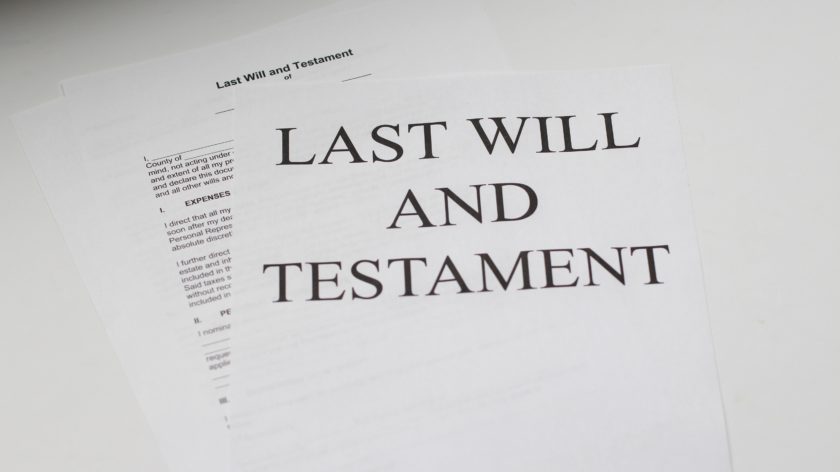Julia Peake, Technical Manager, Nucleus, looks at the recently published report from the Law Commission and accompanying draft legislation, which are seeking to bring Wills more into line with how we live our lives today.
The importance of having a valid Will is well known throughout our industry but, maybe not all of our clients are aware. A valid Will means the client’s appointed legal personal representatives know how they want their wealth, possessions and assets dealt with on their death. This gives a sense of control and peace of mind so who they want to benefit, and importantly who they don’t want to benefit from their estate is known.
If there is no Will, the laws of intestacy apply. These differ depending on your residency and are based upon the family dynamic and circumstances on death. More information about the intricacies of the laws of intestacy within the different UK regions can be found here https://www.gov.uk/hmrc-internal-manuals/inheritance-tax-manual/ihtm12101.
On 16 May, the Law Commission released their report on modernising the Law which govern Wills in England and Wales to make them more in keeping with how we live our lives today and the technology we now have. This was released with a draft bill for Modern Wills Act for consideration by the government. The full documents can be read here Wills-Report-Volume-II-Draft-Bill-and-Explanatory-Notes-Final.pdf and Wills-Report-Volume-I-Report-Final.pdf.
The report and accompanying draft legislation look to bring up to date the current legislation, The Wills Act 1837 and make several recommendations to replace large parts of this making it more appropriate for use in today’s society.
Some of the key recommendations look at:
1. Creation of a valid Will- looking at the strict current procedures which are currently in place to create a valid Will and look at giving the Courts more powers to accept a valid Will in exceptional circumstances.
2. Lowering the age to create a valid Will- the report suggests lowering the minimum age from 18 to 16. This would allow the control where there could be a breakdown in the family whereby the child and parent don’t have an ongoing relationship and allow them to have a say as to what they want to happen after they die, especially important to children who might be suffering a terminal illness.
3. Looking to protect Testators- This can happen when they are under undue influence when it comes to their financial affairs. This can occur when vulnerable clients are forced to create Wills benefiting the people coercing them.
This can also occur when people enter a marriage or registered civil partnership. Currently under English and Welsh law any previously created Wills made prior to marriage/ civil partnership are revoked. This can mean some people lose their financial independence or are coerced to leave all their assets to their spouse/ civil partner especially if this has been a forced marriage.
This might also happen when they are given bad advice or mistakes are made in the creation of the Will and so looking at allowing the courts to intervene in the case of spelling mistakes or when bad advice has been given.
4. Electronic Wills- looking at making electronic Wills valid, which is more in keeping with today’s modern society and how people go about managing their life administration. The report notes that there should still be steps that ensure a Will’s validity but allows for a bit more flexibility to make use of today’s technology.
5. Providing clarity on capacity to create a valid Will. Currently there are 2 tests which are considered when looking at the mental capacity of an individual when creating a valid Will, which can be confusing. The draft legislation suggests the test under The Mental Capacity Act 2005 should be used.
While these proposed changes are good news for modernising Will administration, Wills will need to be reviewed regularly to ensure they reflect the client’s current wants and needs, especially with some of the changes to inheritance tax being proposed in the next couple of years.
Clients may wish to create a trust via their Will on an absolute, discretionary, or immediate post death interest (IPDI) basis depending on their circumstances. During their lifetime, the clients will have full access to their assets, as a Will trust does not come into force until death. So this will still allow the client to make gifts during their lifetime.
Clients could make use of the exempt gifts:
- The annual amount of £3,000 (£6,000 if not used from previous tax year)
- Small gifts of £250 to multiple people so long as it is not the same people who have benefitted from the annual exemption.
- Gifts for marriage, amount will depend upon the relationship.
- Gifting out of normal expenditure, so long as the rules around this exemption are met and records are kept.
Also make larger gifts to trusts which would be potentially exempt transfers or chargeable lifetime transfers, depending on the type of trust used.
Some believe that creating a Will is expensive or complicated. This often is not the case, but it will depend on the complexity of the estate and assets involved. Using a professional can help negate any ambiguity and many solicitors and Will writing professionals also have a storage service to keep important documents safe, which can be useful as sometimes these documents can get lost with house moves.
Engaging in conversations around death and financial planning is never easy but they are essential and while this is legal advice it is important that we speak to clients about this as this could directly impact the financial plan created for them.
Main image: melinda-gimpel-wkfZyteTMOA-unsplash































